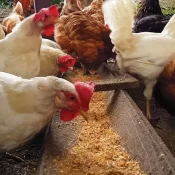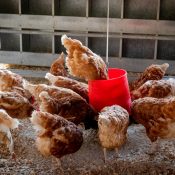Norwegian Students Embrace Kenyan Culture: A Day of Goat Grazing in the Mountains
In a heartwarming exchange of cultures, students from Val School in Norway recently visited Viking Agri Ventures in Kenya. Their goal was to immerse themselves in the daily life of Kenyan smallholder farmers and herders by participating in goat grazing at Osiri Farm, located in Homabay County, facing Lake Victoria. The farm, with its indigenous shrubs and stunning lake views, was established to support locals affected by the HIV pandemic.
 Smallholder farmers in Kenya produce over 60% of the country's food, yet their efforts often go unnoticed. Eager to learn, the Norwegian students spent a day with local youthful herders, gaining insights into the intricate skills required for goat herding and understanding the community's connection to their livestock.
Smallholder farmers in Kenya produce over 60% of the country's food, yet their efforts often go unnoticed. Eager to learn, the Norwegian students spent a day with local youthful herders, gaining insights into the intricate skills required for goat herding and understanding the community's connection to their livestock.
 The hosts at Osiri Farm showcased traditional grazing techniques and highlighted the vital role goats play in their culture and economy. They proudly presented their efforts to create a "smart farm," combining traditional methods with modern innovations such as clean goat sheds and a mix of traditional shrubs with formulated feeds, resulting in high-quality milk and meat. The farm will also serve as a fattening center where community youths can graze their goats and other cattle, contributing their labor to the program. The ultimate goal is to set up a modern abattoir for value addition. This visit was an opportunity for the local community to share their traditions, build international friendships, and explore areas for technological advancements to reduce labor intensity.
The hosts at Osiri Farm showcased traditional grazing techniques and highlighted the vital role goats play in their culture and economy. They proudly presented their efforts to create a "smart farm," combining traditional methods with modern innovations such as clean goat sheds and a mix of traditional shrubs with formulated feeds, resulting in high-quality milk and meat. The farm will also serve as a fattening center where community youths can graze their goats and other cattle, contributing their labor to the program. The ultimate goal is to set up a modern abattoir for value addition. This visit was an opportunity for the local community to share their traditions, build international friendships, and explore areas for technological advancements to reduce labor intensity.
 Such exchanges emphasize the importance of cultural immersion and knowledge sharing between communities, fostering discussions on sustainability, traditional practices, and the global significance of agriculture. This experience highlighted the potential for blending modern techniques with traditional practices, enabling smallholder farmers to thrive while preserving their rich cultural heritage.
Such exchanges emphasize the importance of cultural immersion and knowledge sharing between communities, fostering discussions on sustainability, traditional practices, and the global significance of agriculture. This experience highlighted the potential for blending modern techniques with traditional practices, enabling smallholder farmers to thrive while preserving their rich cultural heritage.
 Smallholder farmers in Kenya produce over 60% of the country's food, yet their efforts often go unnoticed. Eager to learn, the Norwegian students spent a day with local youthful herders, gaining insights into the intricate skills required for goat herding and understanding the community's connection to their livestock.
Smallholder farmers in Kenya produce over 60% of the country's food, yet their efforts often go unnoticed. Eager to learn, the Norwegian students spent a day with local youthful herders, gaining insights into the intricate skills required for goat herding and understanding the community's connection to their livestock.
"We were excited to experience a day in the life of Kenyan herders," shared one student."It’s amazing to see how much knowledge and skill goes into something that seems so simple."The students noted the challenges of open-field grazing and the potential benefits of fenced grazing areas and controlled feeding with processed feeds. These improvements could enhance efficiency while maintaining the indigenous species' taste and environmental diversity.
 The hosts at Osiri Farm showcased traditional grazing techniques and highlighted the vital role goats play in their culture and economy. They proudly presented their efforts to create a "smart farm," combining traditional methods with modern innovations such as clean goat sheds and a mix of traditional shrubs with formulated feeds, resulting in high-quality milk and meat. The farm will also serve as a fattening center where community youths can graze their goats and other cattle, contributing their labor to the program. The ultimate goal is to set up a modern abattoir for value addition. This visit was an opportunity for the local community to share their traditions, build international friendships, and explore areas for technological advancements to reduce labor intensity.
The hosts at Osiri Farm showcased traditional grazing techniques and highlighted the vital role goats play in their culture and economy. They proudly presented their efforts to create a "smart farm," combining traditional methods with modern innovations such as clean goat sheds and a mix of traditional shrubs with formulated feeds, resulting in high-quality milk and meat. The farm will also serve as a fattening center where community youths can graze their goats and other cattle, contributing their labor to the program. The ultimate goal is to set up a modern abattoir for value addition. This visit was an opportunity for the local community to share their traditions, build international friendships, and explore areas for technological advancements to reduce labor intensity.
 Such exchanges emphasize the importance of cultural immersion and knowledge sharing between communities, fostering discussions on sustainability, traditional practices, and the global significance of agriculture. This experience highlighted the potential for blending modern techniques with traditional practices, enabling smallholder farmers to thrive while preserving their rich cultural heritage.
Such exchanges emphasize the importance of cultural immersion and knowledge sharing between communities, fostering discussions on sustainability, traditional practices, and the global significance of agriculture. This experience highlighted the potential for blending modern techniques with traditional practices, enabling smallholder farmers to thrive while preserving their rich cultural heritage. Recent Posts
AdminVIKING0 Comments
Norwegian Students Embrace Kenyan Culture: A Day of Goat Grazing in the Mountains
AdminVIKING0 Comments
Essential Tips for Poultry Farming Success
AdminVIKING0 Comments


